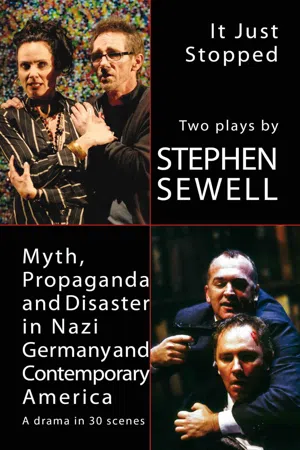
Myth, Propaganda and Disaster in Nazi Germany and Contemporary America and It Just Stopped: Two plays
- English
- ePUB (mobile friendly)
- Available on iOS & Android
Myth, Propaganda and Disaster in Nazi Germany and Contemporary America and It Just Stopped: Two plays
About this book
A savage comedy of manners, It Just Stopped explores our relationship to art, globalisation, death, technology, America, Campari, cardboard boxes and slavery. Sewell's play is funny and shocking in turn. It holds the mirror up to the things we value today and asks the questions: what will we value the day the world just stops, and what would we be willing to trade for our own survival?Written with searing passion and dazzling momentum, Myth, Propaganda and Disaster in Nazi Germany and Contemporary America reverberates with the aftershocks of September 11. With compelling drive and theatrical daring, we are swept from cocktails at the Guggenheim to the hungry vacuum of Ground Zero. Stephen Sewell demands answers to some of the most urgent questions of our times. Where is the line between patriotism and nationalism? What happens when the Land of the Free makes such uncompromising statements as: 'You're either with us or against us'?
Frequently asked questions
- Essential is ideal for learners and professionals who enjoy exploring a wide range of subjects. Access the Essential Library with 800,000+ trusted titles and best-sellers across business, personal growth, and the humanities. Includes unlimited reading time and Standard Read Aloud voice.
- Complete: Perfect for advanced learners and researchers needing full, unrestricted access. Unlock 1.4M+ books across hundreds of subjects, including academic and specialized titles. The Complete Plan also includes advanced features like Premium Read Aloud and Research Assistant.
Please note we cannot support devices running on iOS 13 and Android 7 or earlier. Learn more about using the app.
Information
MYTH, PROPAGANDA AND DISASTER IN NAZI GERMANY AND CONTEMPORARY AMERICA: INTRODUCTION
The assault on international law and democratic institutions currently being waged under the guise of the War on Terror has provoked a storm of protest throughout the world, and within the theatre community, and Myth, Propaganda and Disaster in Nazi Germany and Contemporary America—A Drama in Thirty Scenes is part of that reaction. With its roots in the great tradition of humanist opposition to absurdity and tyranny, from Kafka’s The Trial through to Arthur Miller’s The Crucible and Brecht’s Galileo, Myth tells the story of Talbot Finch—a name chosen to evoke America’s own great liberal tradition, in the name of Atticus Finch, the hero of To Kill a Mockingbird—as he suffers a mysterious persecution at the hands of someone only he can see, and whose existence is denied by all around him. Caught in this nightmarish trap, Talbot questions his own sanity as he confronts the question each of us is asking at the moment: Is this really happening and what can I do to protect myself? What can I do to protect myself from a State that can dispense with any pretence to legal obligations and practices simply by calling me a terrorist? What can I do to protect myself when the ancient prohibitions against torture are being flouted in a gulag of secret prisons dotted across the globe, filled with ghost prisoners apparently beyond the reach of even the International Red Cross and the Geneva Conventions? How can I protect myself when my own government is complicit in the kidnapping and torture of Australian citizens and happy to lie on a daily basis about its knowledge and involvement in international crime? How can I protect myself now?
Table of contents
- Title Page
- Table of Contents
- Copyright Page
- Playwright’s Biography
- It Just Stopped: Introduction
- Myth, Propaganda and Disaster in nazi Germany and Contemporary America: Introduction